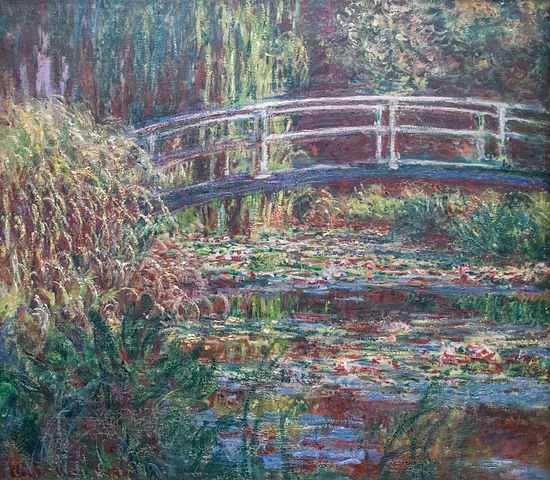
“I knew little about Maud Plunkett. I knew I was here
because the Major had trained us all as cadets.
What I shared with his wife we shared as gardeners.
I had wanted large green words to lie waxen on
the page’s skin, floating but rooted in its lymph as
her lilies in the pond’s cool mud, every ivory prong
spreading in the Japanese peace of Les Nympheas
in the tongue-still noon, the heat, where a wooden bridge
with narrow planks arched over the calligraphic
bamboo, their reflections rewritten when a midge
wrinkled the smoothness, and from them, the clear concentric
rings from a pebble, from the right noun on a page.
I was both there and not there. I was attending
the funeral of a character I’d created;
the fiction of her life needed a good ending
as much as mine; that night by the tasselled shade
with its oblong halo over her bowed head sewing,
I had looked up from the green baize with the Major’s
face from the ornate desk to see light going
from her image, and that image was my mother’s,
whose death would be real, real as our knowing.”
–from Omeros by Derek Walcott, Chapter LIII, Part II
My reading life seems to have seasons. Sometimes I’m all about the non-fiction, history, science, biography. Sometimes it’s literary fiction. Sometimes light genre fiction. There are seasons when I’m juggling multiple books in different categories and seasons when I can only seem to hyperfocus on one book at a time. (Light fiction often gets me binge-reading.) And then there are seasons when I read poetry. I like poetry, but sometimes I don’t seem to be able to read much of it, though curiously social media has increased my poetry intake an amazing amount. I’ve discovered new poets and found that it’s easy to read and share a short lyric quickly while bouncing around from one thing to another.
I’ve been reading Omeros on and off for a while now– almost two years since I first posted about it in January of 2017. I love it, but sometimes my head just doesn’t seem to be in it. The other day when I was tidying my room I found it tucked into the backpack I took with me on two vacations this year– the book didn’t get cracked on either one. Then yesterday Bella found it on the floor where I’d hopefully put it, thinking… maybe? I grabbed it this morning when we were headed out to her orthodontist appointment. And in the waiting room I read three chapters and re-read a bit of what I’d already read, too. Maybe I’ll actually finish it this year.
I love this passage where Walcott the poet inserts himself into the poem– he does it quite regularly– this time as a mourner, attending the funeral of one of the main characters. Generally I’m not a huge fan of this kind of post-modernist self-awareness. But Walcott makes it work. Maybe because the poem still has an overall narrative that keeps driving it forward, maybe because I’m just so in love with his lyric voice that I’ll forgive him a lot.
I love the image of the clear concentric rings rippling out from the right noun on the page. The choice of the word “noun” instead of “word”.
Every time I pick this book up I wonder how I ever put it down.





